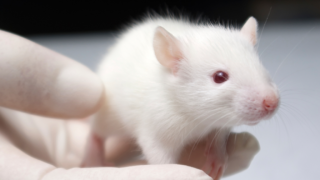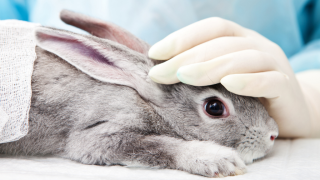Are we seeing the beginning of the end of monkey research?
In 2015 we have seen closures of primate facilities across the UK, Europe and USA.
This year we finally discovered that the MRC Human Reproductive Sciences Unit had closed in 2011. The laboratory had used marmosets for years to study reproductive problems. We found out this news following a Freedom of Information request.
All the marmosets were sent to zoos in secret.
We had previously criticised the MRC Human Reproductive Sciences Unit for its use of baby marmosets to study the effects of chemicals on growth and development (much of which is already known from human studies). The new MRC University of Edinburgh Centre for Reproductive Health has no plans to use monkeys in the future.
Earlier this year in Italy, the University of Modena ended their primate experiments with the help of our Italian partner, Lega Antivivisezione (LAV).
A Memorandum of Understanding was signed with the Dean of the University which committed to ending primate experiments. They also signed over 16 macaque monkeys who were due to be implanted with devices in their brains. LAV has assumed responsibility for the entire colony of rescued macaques. And we’re delighted they are now ensuring the monkeys’ recovery in specialized centers where they will receive proper healthcare and will live a hopefully long life, with freedom to play outdoors.
Following our investigation at the Max Planck Institute for Biological Cybernetics in Tübingen, Germany, the centre’s director Niko Logothetis pledged to end his use of primates. However, it is still unclear if the centre itself, under a different leadership, may still sadly continue its cruel research.
Finally, just this week we learnt that the USA National Institute of Health (NIH) is closing down one of its laboratories that has been using baby monkeys in cruel experiments for the past eight years.
The Eunice Kennedy Shriver National Institute of Child Health and Human Development (NICHD) in Maryland, USA is responsible for subjecting monkeys to barbaric behavioural experiments related to developmental problems. Many of the studies have involved:
- separating baby monkeys from their mothers at birth
- sedating mothers in front of their babies react to see how they react
- purposefully startling monkeys with loud noises
- subjecting them to invasive procedures such as brain injections and spinal taps
- and measuring their long term stress levels.
The laboratory, which currently holds around 300 monkeys, has developed a three-year plan to phase out these experiments. It will gradually transfer all of the monkeys to other ‘facilities’ across the country. We urge the NIH to ensure that the monkeys are homed in sanctuaries where they can recuperate and live a happy and free life.
Reasons given for the closures include financial as well as public pressure. Perhaps finally researchers are realising that not only do the public object to this cruel treatment of animals, but that it is just not worth it.












